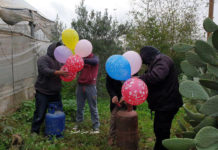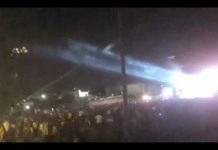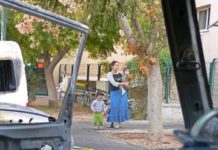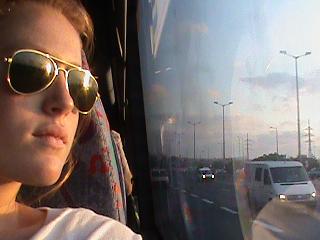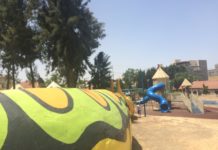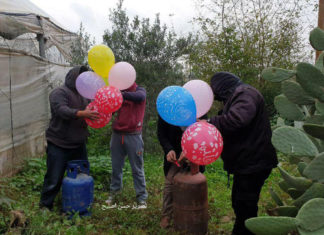I arrived 40 minutes early for my bus to Sderot, yet to me that was not enough time. In a matter of hours, I would be in a front row seat documenting the British Ambassador’s visit with Sderot Media Center. I needed to practice with my video camera. So I took it out and filmed people running to their bus, waiting for their bus, and sleeping on the benches near their bus. I filmed the birds trotting through the station, the stands putting out fresh batches of burekas, and families hugging each other goodbye. I needed to become familiar with everything as quickly as possible. This was the opportunity of a lifetime.
I arrived at the media center and was struck by the excitement around me as I watched each one of the staff quickly tuck in their shirts and tidy their desks. I could only imagine how important this visit was. Anav Silverman would be leading the visit and the day before I revealed my anxiety about my work the next day. She comforted me, “The trick to these kinds of things is to have faith that you know what you are doing.” I looked at Anav that morning waiting by the door, she sipped water and she looked entirely prepared for what was to come.
It was just minutes to the arrival of the Ambassador and I took out my video camera in order to be ready and in the right spot for his entrance. “So, Sarah,” Sderot Media Center Director Noam Bedein began behind me. “Are you familiar with a still camera?” I had taken one photography class in high school and “an easy A” would be an understatement-the class was more like a free period. Anav’s advice played through my head as Noam handed me the camera, and with composure I replied. “Yes, of course.”
The British Ambassador’s luxury vehicle turned on to Histadrut Street and within moments he passed the front window and entered the front room. It took me a moment to shake myself out of shock and into the assignment. I tried to capture each handshake, posture, and expression. I snapped photographs balanced on the tips of my toes and crouched close to the floor. I pictured myself as paparazzi on the red carpet, determined to get every possible shot.
Anav and Noam gave an introduction to Sderot, including an overview of the facts and statistics. Alongside a diplomat of the highest rank, I was witnessing the facts for the first time.
Following the Ambassador’s tour of the office, we threw ourselves inside Noam’s car to travel to the Shock Treatment Center. There were more of us than seats, so I jumped onto the lap of the center’s news desk director, Metial Ohayon. Meital and I had only met that day, but I can now report that squashing a stranger in a cramped car racing to catch a story is a great way to launch a new friendship.
Anav translated the poignant testimony of the head of the Shock Treatment Center, Dr. Adrianna Katz, to the Ambassador. As the three discussed the center’s danger of closing in the small room lined with beds, the British Ambassador examined the facility with eyes that grew wide with attention and concern.
With another pile-up in the car, we moved to the Sderot Trauma Center to speak with director Dalia Yosef. The group crowded into the small elevator with the Ambassador compacted in the back. He stood in front of the elevator’s mirror and as I turned to take an up-close shot, I was startled to see my own reflection behind him. There I was with a camera secured around my neck, squeezed in a small elevator, experiencing this amazing story side-by-side with the British Ambassador.
While speaking with Dalia Yosef, Ambassador Phillips asked how one comforts a child after an attack, especially if the attacks persist. He explained how if he was to comfort someone, he would like to say there is hope for the future, however, the future in Sderot is unforeseen. “This is the problem,” said Yosef. “The stress and awareness takes over their everyday life.”
There I was performing a task for which many strive. The opportunity to capture this event was a huge achievement for my career. However, as I crouched next to the table zooming in on Ambassador Phillips’ expression of compassion, the enormity of the political and human situation tempered my excitement. I couldn’t help but feel utterly powerless. It is simply intolerable that children grow up in a world where attack takes over their everyday life.
At that moment I understood that my internship wasn’t only about my career growth. The internship was about working towards a greater goal from which I would have to work toward from this personal accomplishment.



